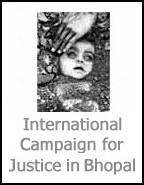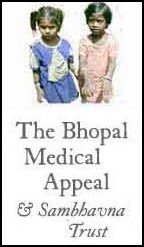Cambridge Council
Dumps Dow Chemical, Cites Bhopal Cambridge City Hall - Activists representing peace,
the environment, labor and human rights climbed a giant ‘scale
of justice’ at 5:30pm on Tuesday, September 26th, 2006 to
celebrate Cambridge’s unanimous passage of the ‘Justice
for Bhopal’ resolution. The legislation asks the City to take
shareholder and purchasing action against Dow Chemical until the
company faces its responsibilities to the Bhopal Chemical Disaster
survivors. The resolution asks the Cambridge Retirement Board to use their ~12,000 shares in Dow to co-file shareholder resolutions regarding Bhopal and to divest of Dow bonds until Dow addresses the survivor’s demands. It also requests a report of what Dow products the city buys and options for substitution. “People concerned with how our increasingly globalized economy develops, should be thrilled about this policy,” said Nate Stell from local Amnesty International Group 133. “Allowing Dow Chemical to act with impunity sets a very dangerous precedent in international commerce with respect to human rights. It’s important to that we let Dow and other would-be offenders know that we will not stand for these kinds of abuses.” Harvard student Kaveri Rajaraman said, “Dow
Chemical continues to violate safety standards, and the victims
of Dow in the US and abroad continue to mount. This resolution will
push for clean up of the toxic contamination in Bhopal and hold
Dow to better safety standards.” Aquene adds: Spoiling Dow Recruiting On October 17, 2006, the Boston Coalition for Justice in Bhopal made sure that MIT students attending a Dow recruiting session got the real story, not just Dow’s feel-good propaganda. About 30 chemistry and chemical engineering doctoral candidates and post-docs were interested enough to come to the MIT recruiting session, but after learning about Dow’s crimes around the world, it’s doubtful that many will end up working there. Aquene picks up the story: We showed up 15 minutes before the session started and handed
out information to everyone who came to the session. We were dressed
professionally and our information was very nicely laid out so most
people thought we were with Dow. (everyone took it except for people
paid by career services). [We gave them the clinic brochure, the
executive summary of the amnesty report and one of the mock Dow
ads] We taped up the Amnesty "Zaki is Dead" posters (about
more recent deaths in Bhopal) up on the walls outside of the session.
We went out for dinner to celebrate! Lessons learned: The Survivors Speak AID Boston hosted ICJB's talk by Rashida Bi and Champa Devi Shukla
at MIT on May 3rd, 2004. Nityanand, from ICJB, served as a translator
for both. The event was publicized on AID Boston's, many Champa Devi talked about experience of her family on the night of MIC gas leak in Bhopal, and how the affects of gas exposure haunted her family tragically in the following years. Rashida Bee emphasized the four demands they have of Dow - the extradition of Warren Anderson, chief executive officer of Union Carbide at the time of the disaster, to face culpable homicide charges in India; monitoring of the victims' health and disclosure about the ill effects of the leaked chemicals; cleanup of the site; and economic support for those affected. They concluded by referring to their recent inroads, including getting a US Appeals court to pass an order asking Indian government to pass an order if it wants Dow to clean up the site. The event was covered in
India New England newspaper. Halloween: Dow is Death On Nov. 7, 2005, Sherry, Aquene, Suvrat, Kaveri and Neeraj reached several hundred people with fliers taped with chocolate gold coins telling the Bhopal story and that ‘Dow profits from Death’. Signatures for the “Don’t Work for Dirty Dow Pledge” were also collected. Students responded well to the Dow Grim Reaper Costume. Documentary Screening In recognition of the Global Day of Action Against Corporate Crime and in remembrance of the victims of Bhopal, on December 13th, 2004, the Boston chapter of the Association for India's Development, Doctors for Global Health, the South Asian Center & the Alliance for Secular and Democratic South Asia sponsored a screening of "Hunting Warren Anderson" attended by approximately 50 people. A flyer for the event can be found at www.aidboston.org/files/bhopalflyer2.pdf. Anniversary Protest
for Justice in Bhopal
On December 3rd, 2005, the 21st Anniversary of the Bhopal disaster, the Boston Coalition for Justice in Bhopal held a candlelight vigil in Boston Commons (Park Street T Stop) during Rush Hour, starting at 4:15. Even though it was a windy and cold day, a lot of folks braved the winds for a solemn memorial to the lives lost and in solidarity with the Bhopal survivors. The Justice For Bhopal banner, the recitation of the powerful survivor accounts, short handouts, and the large posters raised awareness amongst a lot of people during the rush hour in front of Park Street subway station. Then we walked to the Community Church for a screening of the 17-minute Bhopal documentary, “Twenty Years Without Justice.” We had a round of introductions for some new interested folks and tried to encourage planning for next year for the Bhopal campaign followed by going to dinner together. So, it was a successful event over all for the coalition. We hope to also continue the momentum from this year and plan more things for next year. Boston Coalition For Justice in Bhopal is a group that was formed for Bhopal action throughout the year with various Boston based groups in the middle of this year. The members of the group are: AID Boston, Somerville Amnesty International Chapter, Environment Health Fund, South Asia Center and Alliance For Secular and Democratic South Asia. The overall coordinator for this group is Aquene Freechild from Environment Health Fund/Students For Bhopal. Read this article in JSONS! Read more in India New England! Bhopal Seminar On March 4, 2004, the Program on Human Rights and Justice hosted a seminar entitled Industrial Impunity: Remembering the Bhopal Gas Tragedy. The program began with the screening of a short documentary film put together by Shahid Nanavanti. The film was a composite of photographs and visual information accented by a poignant narration about the tragic events and aftermath of December 3, 1984 in Bhopal. After the showing of the documentary, Shahid spoke some about his inspiration and aims for the creation of the film. After Shahid finished speaking, Dr. Ken Geiser, director of the Massachusetts Toxics Use Reduction Institute continued the seminar. Dr. Geiser spoke, first, of his experience visiting Bhopal almost immediately after the tragedy and the profound impact it had had on his life. He then spoke about his work to reduce the use and production of toxic chemicals in Massachusetts. This work, he explained, serves as an example of how we might restructure corporations to be more socially responsible and prevent future Bhopals. Following Dr. Geiser’s remarks, Matt Lehrich, a Student Organizer with the International Campaign for Justice in Bhopal spoke. His comments focused on the current student movement and continued effort to bring about justice for the people of Bhopal. In particular, he highlighted the vital importance of setting a precedent of corporate accountability so that future corporations will not cut costs on safety and sacrifice people for profits. After all three speakers finished, the roughly 20 people in attendance posed questions for the three of them. These questions and their answers sparked discussion among everyone in the room about how to help the people of Bhopal and how to work towards making sure such a terrible tragedy never occurs again. Read more about the event in the India New England News. 'Die in' at Copley Square On May 6, 2006, members of the Boston Coalition for Justice in
Bhopal joined supporters in three other cities – Seattle,
Cincinnati, and Portland – in taking action in advance of
the Dow Shareholders Meeting. Supporters in Boston organized a ‘die-in’ at Copley Square, covering bodies with white shrouds. The names of those killed in the 1984 Disaster, and those who died as recently as 2004, were perched atop the veiled bodies, much the way unidentified bodies were numbered after the gas leak. The Dow Grim Reaper passed among the victims symbolizing Dow Chemical's role in the ongoing poisoning of 20,000 Bhopal residents forced to drink contaminated water. Dry ice haze mimicked the methyl isocyanate gas that leaked from the Union Carbide plant 21 years ago after midnight, causing over 8,000 people to drown in their own fluids within days of the gas leak. "I have family in Bhopal and feel that while I am in the US, it is my responsibility to use my privilege in the interests of justice for the victims," said Suvrat Raju, a Physics Ph.D candidate at Harvard at the Boston event. "Dow Chemical's behavior in Bhopal is symbolic of the behavior of much of the chemical industry. The industry has changed little since this tragedy – learned little from 22,000 deaths in Bhopal. We have poor chemical security laws here in the US, despite 110 facilities that could endanger more than a million people. We all live in Bhopal." said Aquene Freechild, posing as the Dow Chemical Grim Reaper in Boston. Several hundred passers-by witnessed the demonstration, which was also covered by the Boston Herald! Rachna Speaks on Bhopal Rachna Dhingra from Bhopal, invigorated a 50 strong audience in a classroom of MIT on a snowy Monday night. The talk, titled “We all live in Bhopal”, on 22nd Jan 2007 was sponsored by Association for India’s Development, Amnesty and Boston Coalition for Justice in Bhopal. Rachna is an organizer for the International Campaign for Justice in Bhopal and an AID Jeevansaathi. Above all, she lives and works with survivors of the gas disaster which killed over 20,000 people and continues to take a toll of 30 lives a month, even after 22 years. In Feb-March of 2006, Rachna along with many survivors, undertook an arduous walk of 800 Km from Bhopal to Delhi to convey the 6 demands of the survivors groups to the Prime Minister, 4 of which were met. Rachna’s talk started off by explaining how the worst industrial disaster, on the intervening night of 2nd and 3rd Dec. 1984, was in the making for many years. Rather than an unfortunate accident, it was a result of deliberate neglect, disregard for the lives of poor and putting profit above all. She touched upon the haphazard long term medical response of the Govt. of India and the inadequate, late and mismanaged compensation disbursal. People had fallen in debt traps by the time the first compensation arrived. Rachna highlighted the ongoing disaster of the ground water contamination, being caused by the chemicals lying in the abandoned factory site and the sickness it was causing amongst the communities living in the vicinity. These discussion elicited many queries from the audience and it organically turned into an interactive session of questions, answers and passionate perspectives. Protests, marches, petitions and research have sustained the demand for justice by survivors groups for 22 years, of which Rachna is an integral part. Through her presentation and interactions, Rachna gave glimpses of the perspectives of the survivors – of their pain and sufferings; of their unwavering quest for justice; of their wisdom and resilience. “People have to become a voice not victims”, said Rachna. And that applies to all of us, not just survivors in Bhopal. Screening of "Bhopal Express" On Sunday, May 1, 2004, as part of a two-day program on Bhopal, AID Boston and Students for Bhopal sponsored a screening of Bhopal Express at MIT with the help of MIT’s Lecture Series Committee. The event was attended by roughly 70 people, who seemed to find the film entertaining but shocking. Following the film, there was a brief discussion about the current state of affairs in Bhopal and the need for much greater corporate accountability. In the second half of the two-day series, Bhopal survivors and Goldman Environmental Prize winners, Rashida Bee and Champa Devi Shukla will be speaking at MIT on Monday, May 2. Film Screening and Discussion with Raj Sharma On Saturday, May 20, 2000, the film Bhopal Express was screened at MIT, and donations were gathered to support the work of the Sambhavna Clinic in Bhopal. The film was followed by a discussion with Rajan Sharma, the attorney representing the Bhopal gas victims in the class action lawsuit filed in the United States. Organized by AID-Boston and Friends of the River Narmada. Vigil Marks Indefinite Fast in Delhi On April 11, 2006, 12 members of the
|
The international student campaign to hold Dow
accountable for Bhopal, and its other toxic legacies around the world.
For more information about the campaign, or for problems regarding this
website, contact Ryan
Bodanyi, the Coordinator of Students for Bhopal.
WE
ALL LIVE  IN
BHOPAL
IN
BHOPAL
"The year 2003 was a special year in the history of the campaign for justice in Bhopal. It was the year when student and youth supporters from at least 30 campuses in the US and India took action against Dow Chemical or in support of the demands of the Bhopal survivors. As we enter the 20th year of the unfolding Bhopal disaster, we can, with your support, convey to Dow Chemical that the fight for justice in Bhopal is getting stronger and will continue till justice is done. We look forward to your continued support and good wishes, and hope that our joint struggle will pave the way for a just world free of the abuse of corporate power."
Signed/ Rasheeda Bi, Champa Devi Shukla
Bhopal Gas Affected Women Stationery Employees Union
International Campaign for Justice in Bhopal
This is what the www.studentsforbhopal.org site looked like in early 2008. For more recent information, please visit www.bhopal.net.






 ever
want a disaster like Bhopal to occur again. This kind of lawlessness
cannot be tolerated,” Coalition for Justice in Bhopal member
Aquene Freechild said, dressed in white to represent the peace movement
resolution backers.
ever
want a disaster like Bhopal to occur again. This kind of lawlessness
cannot be tolerated,” Coalition for Justice in Bhopal member
Aquene Freechild said, dressed in white to represent the peace movement
resolution backers. MIT,
and some non-MIT mailing lists, and we put event flyers were put
around. About 40 people attended the event - most of them were not
previously seen in AID's talks, which was a positive sign.
MIT,
and some non-MIT mailing lists, and we put event flyers were put
around. About 40 people attended the event - most of them were not
previously seen in AID's talks, which was a positive sign.





 Boston
Coalition for Justice in Bhopal and other supporters gathered to
hold a solemn vigil in support of the indefinite fast begun by six
Bhopal survivors and supporters in Delhi. The indefinite fast follows
the epic 500-mile
Boston
Coalition for Justice in Bhopal and other supporters gathered to
hold a solemn vigil in support of the indefinite fast begun by six
Bhopal survivors and supporters in Delhi. The indefinite fast follows
the epic 500-mile